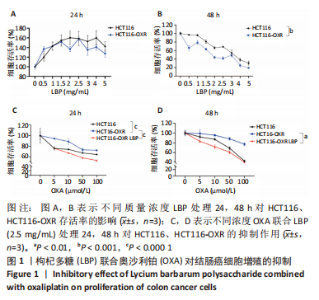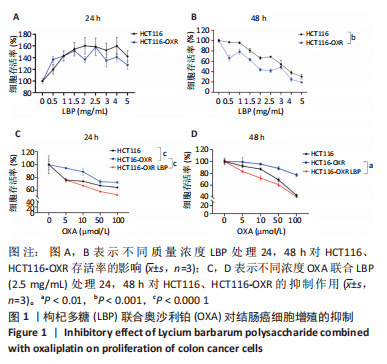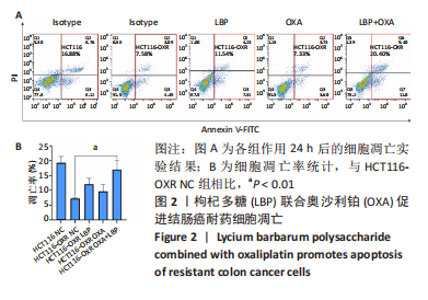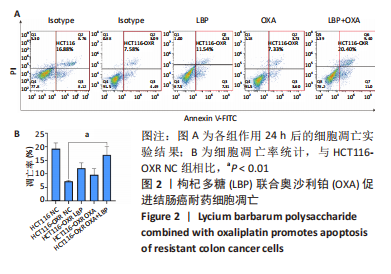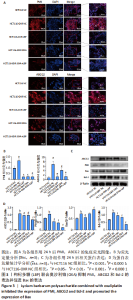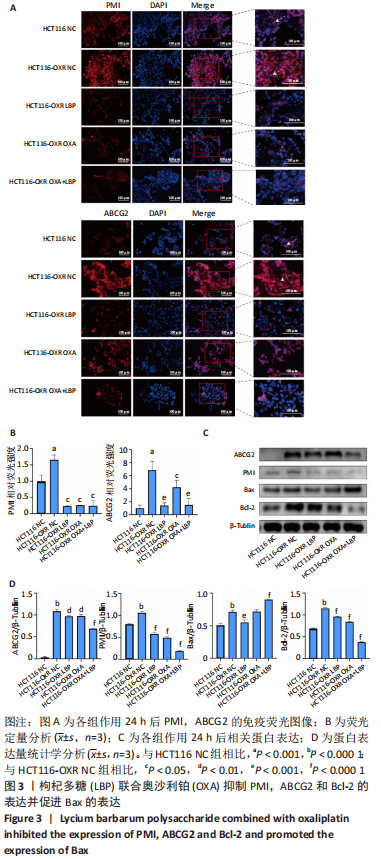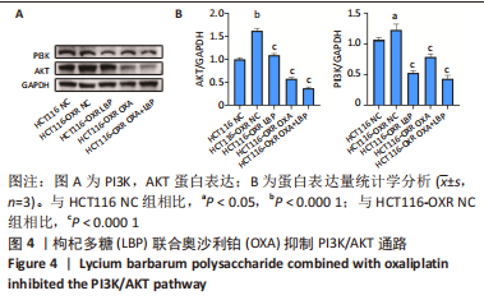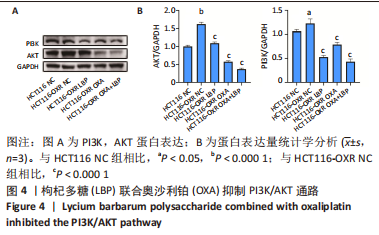[1] SIEGEL RL, MILLER KD, FUCHS HE, et al. Cancer statistics, 2022. CA Cancer J Clin. 2022;72(1):7-33.
[2] 周家琛,郑荣寿,王少明,等.2020年中国和世界部分国家主要消化道肿瘤负担比较[J].肿瘤综合治疗电子杂志,2021,7(2):26-32.
[3] KUIPERS EJ, GRADY WM, LIEBERMAN D, et al. Colorectal cancer. Nat Rev Dis Primers. 2015;1:15065.
[4] JIAO R, LIU Y, GAO H, et al. The Anti-Oxidant and Antitumor Properties of Plant Polysaccharides. Am J Chin Med. 2016;44(3):463-488.
[5] RAN L, CHEN F, ZHANG J, et al. Antitumor effects of pollen polysaccharides from Chinese wolfberry on DU145 cells via the PI3K/AKT pathway in vitro and in vivo. Int J Biol Macromol. 2020;152:1164-1173.
[6] MASCI A, CARRADORI S, CASADEI MA, et al. Lycium barbarum polysaccharides: Extraction, purification, structural characterisation and evidence about hypoglycaemic and hypolipidaemic effects. A review. Food Chem. 2018;254:377-389.
[7] YANG S, CHEN X, SUN J, et al. Polysaccharides from traditional Asian food source and their antitumor activity. J Food Biochem. 2022;46(3): e13927.
[8] GEORGIEV KD, SLAVOV IJ, ILIEV IA. Antioxidant Activity and Antiproliferative Effects of Lycium barbarum’s (Goji berry) Fractions on Breast Cancer Cell Lines. Folia Med (Plovdiv). 2019;61(1):104-112.
[9] MIAO Y, XIAO B, JIANG Z, et al. Growth inhibition and cell-cycle arrest of human gastric cancer cells by Lycium barbarum polysaccharide. Med Oncol. 2010;27(3):785-790.
[10] ZHANG M, TANG X, WANG F, et al. Characterization of Lycium barbarum polysaccharide and its effect on human hepatoma cells. Int J Biol Macromol. 2013;61:270-275.
[11] BANGERA M, GOWDA K G, SAGURTHI SR, et al. Structural and functional insights into phosphomannose isomerase: the role of zinc and catalytic residues. Acta Crystallogr D Struct Biol. 2019;75(Pt 5):475-487.
[12] SAITO Y, KINOSHITA M, YAMADA A, et al. Mannose and phosphomannose isomerase regulate energy metabolism under glucose starvation in leukemia. Cancer Sci. 2021;112(12):4944-4956.
[13] CAZET A, CHAREST J, BENNETT DC, et al. Mannose phosphate isomerase regulates fibroblast growth factor receptor family signaling and glioma radiosensitivity. PLoS One. 2014;9(10):e110345.
[14] HUANG FF, WU DS, ZHANG L, et al. Inactivation of PTEN increases ABCG2 expression and the side population through the PI3K/Akt pathway in adult acute leukemia. Cancer Lett. 2013;336(1):96-105.
[15] PEREGO P, ROBERT J. Oxaliplatin in the era of personalized medicine: from mechanistic studies to clinical efficacy. Cancer Chemother Pharmacol. 2016;77(1):5-18.
[16] SZAKÁCS G, PATERSON JK, LUDWIG JA, et al. Targeting multidrug resistance in cancer. Nat Rev Drug Discov. 2006;5(3):219-234.
[17] ZHANG Y, WU ZX, YANG Y, et al. Poziotinib Inhibits the Efflux Activity of the ABCB1 and ABCG2 Transporters and the Expression of the ABCG2 Transporter Protein in Multidrug Resistant Colon Cancer Cells. Cancers (Basel). 2020;12(11):3249.
[18] MAO Q, UNADKAT JD. Role of the breast cancer resistance protein (BCRP/ABCG2) in drug transport--an update. AAPS J. 2015;17(1):65-82.
[19] HU T, LI Z, GAO CY, et al. Mechanisms of drug resistance in colon cancer and its therapeutic strategies. World J Gastroenterol. 2016; 22(30):6876-6889.
[20] MOHAN A, RAJ RR, MOHAN G, et al. Reporters of Cancer Stem Cells as a Tool for Drug Discovery. Front Oncol. 2021;11:669250.
[21] MA L, LIU T, JIN Y, et al. ABCG2 is required for self-renewal and chemoresistance of CD133-positive human colorectal cancer cells. Tumour Biol. 2016;37(9):12889-12896.
[22] 钟姣,王哲,吴洪斌.香菇多糖对人乳腺癌细胞MCF-7行紫杉醇化疗的增敏作用[J].中国肿瘤外科杂志,2020,12(3):236-240.
[23] 曾凡艳,黄增琼,朱小东.中药复方及单体成分对鼻咽癌放射增敏研究进展[J].亚太传统医药,2022,18(5):225-230.
[24] VENOOK AP, NIEDZWIECKI D, LENZ HJ, et al. Effect of First-Line Chemotherapy Combined With Cetuximab or Bevacizumab on Overall Survival in Patients With KRAS Wild-Type Advanced or Metastatic Colorectal Cancer: A Randomized Clinical Trial. JAMA. 2017;317(23): 2392-2401.
[25] REYES ME, RIQUELME I, SALVO T, et al. Brown Seaweed Fucoidan in Cancer: Implications in Metastasis and Drug Resistance. Mar Drugs. 2020;18(5):232.
[26] WANG M, CHEN W, CHEN J, et al. Abnormal saccharides affecting cancer multi-drug resistance (MDR) and the reversal strategies. Eur J Med Chem. 2021;220:113487.
[27] ICHIKAWA M, SCOTT DA, LOSFELD ME, et al. The metabolic origins of mannose in glycoproteins. J Biol Chem. 2014;289(10):6751-6761.
[28] NARAYANAN S, FAN YF, GUJARATI NA, et al. VKNG-1 Antagonizes ABCG2-Mediated Multidrug Resistance via p-AKT and Bcl-2 Pathway in Colon Cancer: In Vitro and In Vivo Study. Cancers (Basel). 2021;13(18):4675.
[29] LU YH, CHANG YP, LI T, et al. Empagliflozin Attenuates Hyperuricemia by Upregulation of ABCG2 via AMPK/AKT/CREB Signaling Pathway in Type 2 Diabetic Mice. Int J Biol Sci. 2020;16(3):529-542.
[30] GONZALEZ PS, O’PREY J, CARDACI S, et al. Mannose impairs tumour growth and enhances chemotherapy. Nature. 2018;563(7733):719-723.
[31] SHTRAIZENT N, DEROSSI C, NAYAR S, et al. MPI depletion enhances O-GlcNAcylation of p53 and suppresses the Warburg effect. Elife. 2017; 6:e22477.
[32] MOHRMANN K, VAN EIJNDHOVEN MA, SCHINKEL AH, et al. Absence of N-linked glycosylation does not affect plasma membrane localization of breast cancer resistance protein (BCRP/ABCG2). Cancer Chemother Pharmacol. 2005;56(4):344-350.
[33] DIOP NK, HRYCYNA CA. N-Linked glycosylation of the human ABC transporter ABCG2 on asparagine 596 is not essential for expression, transport activity, or trafficking to the plasma membrane. Biochemistry. 2005;44(14):5420-5429.
[34] NAKAGAWA H, WAKABAYASHI-NAKAO K, TAMURA A, et al. Disruption of N-linked glycosylation enhances ubiquitin-mediated proteasomal degradation of the human ATP-binding cassette transporter ABCG2. FEBS J. 2009;276(24):7237-7252.
[35] NAKAGAWA H, TOYODA Y, WAKABAYASHI-NAKAO K, et al. Ubiquitin-mediated proteasomal degradation of ABC transporters: a new aspect of genetic polymorphisms and clinical impacts. J Pharm Sci. 2011; 100(9):3602-3619.
|
